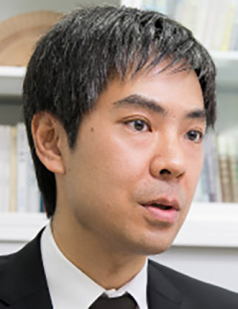

报告题目:Metastable Layered Oxynitride Photocatalysts for Artificial Photosynthesis
报告时间:2021年10月11日上午10:00-11:30
报告地点:腾讯会议
会议ID: 784 8908 5732
报 告 人:Prof. Kazuhiko Maeda(副教授、东京工业大学)
报告主持人:Prof. Masakazu Ampo(教授、学院&大阪府立大学)
报告摘要:
Two-dimensional (2D) undoped layered oxynitrides are potential candidates as high performance photocatalysts that work under visible light. However, synthesis of 2D layered oxynitrides is generally difficult because most of them are metastable phases. Nevertheless, our efforts of refining the preparation of oxide precursor and nitridation conditions enabled to synthesize a phase-pure Li2LaTa2O6N with a layered perovskite structure and visible light absorption up to 500 nm.[1] Visible-light-driven CO2 reduction into formate (λ > 400 nm) proceeded with high selectivity when Li2LaTa2O6N was modified with a binuclear Ru(II) complex, while well-known 3D oxynitride perovskites (e.g., CaTaO2N and LaTaON2) did not show functionality. Unfortunately, however, Li2LaTa2O6N is not very stable in aqueous environment, which limits its application as a photocatalyst. Actually, it had been reported that layered oxynitrides have inherent instability in contact with water, accompanied by loss of nitrogen content that finally weakens visible light absorption. An exceptional case is K2LaTa2O6N (more specifically, K2LaTa2O6N•1.6H2O), which is a Ruddlesden-Popper phase two-layer perovskite analogous to Li2LaTa2O6N and has a band gap of 2.5 eV.[2] This material undergoes in situ H+/K+ exchange in aqueous solution while keeping its visible light absorption capability. The protonated, Ir-modified K2LaTa2O6N (H+/Ir/K2LaTa2O6N) exhibited photocatalytic activity for H2 evolution from aqueous NaI solution under visible light, outperforming Pt/ZrO2/TaON and Pt/SrTiO3:Rh, which are one of the best-performing oxynitride and oxide photocatalysts for H2 evolution, respectively. Z-scheme overall water splitting was accomplished using the H+/Ir/ K2LaTa2O6N in combination with Cs-modified Pt/WO3 as an O2 evolution photocatalyst in the presence of I3–/I– shuttle redox couple.
[1] T. Oshima, T. Ichibha, K. S. Qin, K. Muraoka, J. J. M. Vequizo, K. Hibino, R. Kuriki, S. Yamashita, K. Hongo, T. Uchiyama, K. Fujii, D. Lu, R. Maezono, A. Yamakata, H. Kato, K. Kimoto, M. Yashima, Y. Uchimoto, M. Kakihana, O. Ishitani, H. Kageyama, K. Maeda, Angew. Chem. Int. Ed. 2018, 57, 8154-8158.
[2] T. Oshima, T. Ichibha, K. Oqmhula, K. Hibino, H. Mogi, S. Yamashita, K. Fujii, Y. Miseki, K. Hongo, D. Lu, R. Maezono, K. Sayama, M. Yashima, K. Kimoto, H. Kato, M. Kakihana, H. Kageyama, K. Maeda, Angew. Chem. Int. Ed. 2020, 59, 9736-9743.
3) T. Oshima, D. Lu, O. Ishitani and K. Maeda, Angew. Chem. Int. Ed. 2015, 54, 2698.
4) T. Oshima, S. Nishioka, Y. Kikuchi, S. Hirai, K.-i. Yanagisawa, M. Eguchi, Y. Miseki, T. Yokoi, T. Yui, K. Kimoto, K. Sayama, O. Ishitani, T. E. Mallouk, K. Maeda. J. Am. Chem. Soc. 2020, 142, 8412.

报告人简介:
Kazuhiko Maeda, 2007年博士毕业于东京大学,师从Kazunari Domen教授。2008-2009年在美国宾夕法尼亚州立大学从事博士后研究(合作导师:Thomas E. Mallouk教授),2009年加入东京大学任助理教授,2012年加入东京工业大学任副教授。2010-2014年期间任命为PRESTO/JST研究员,主要的研究兴趣是光能到化学能转化的多相光催化研究,特别是光解水和二氧化碳固定。